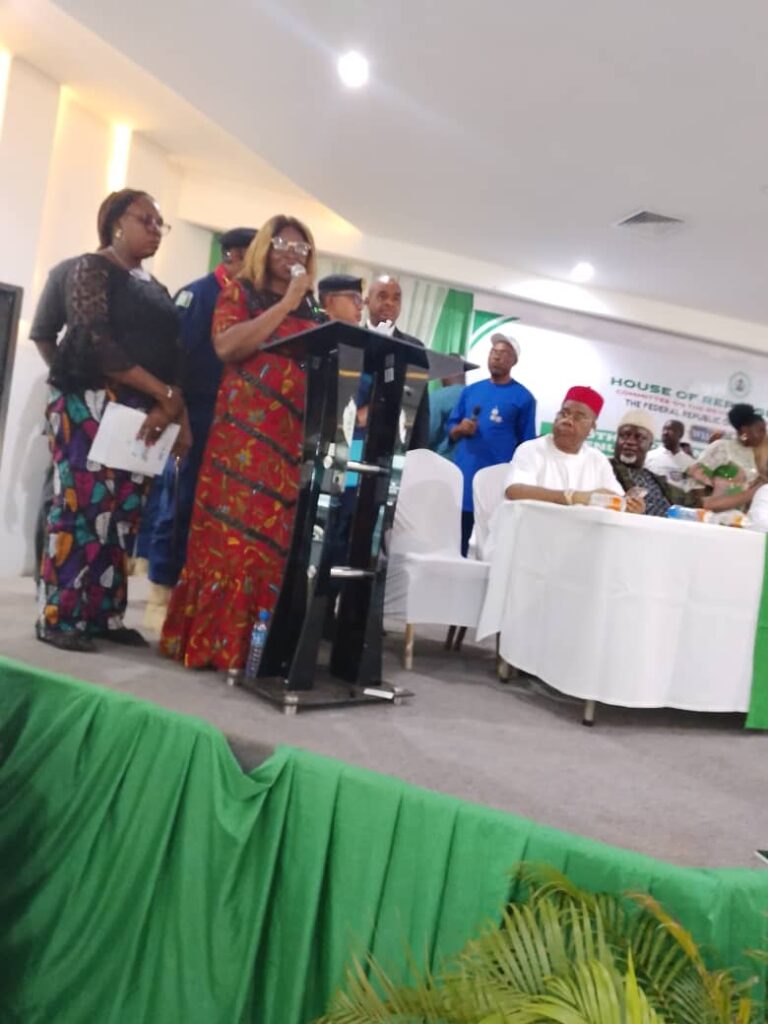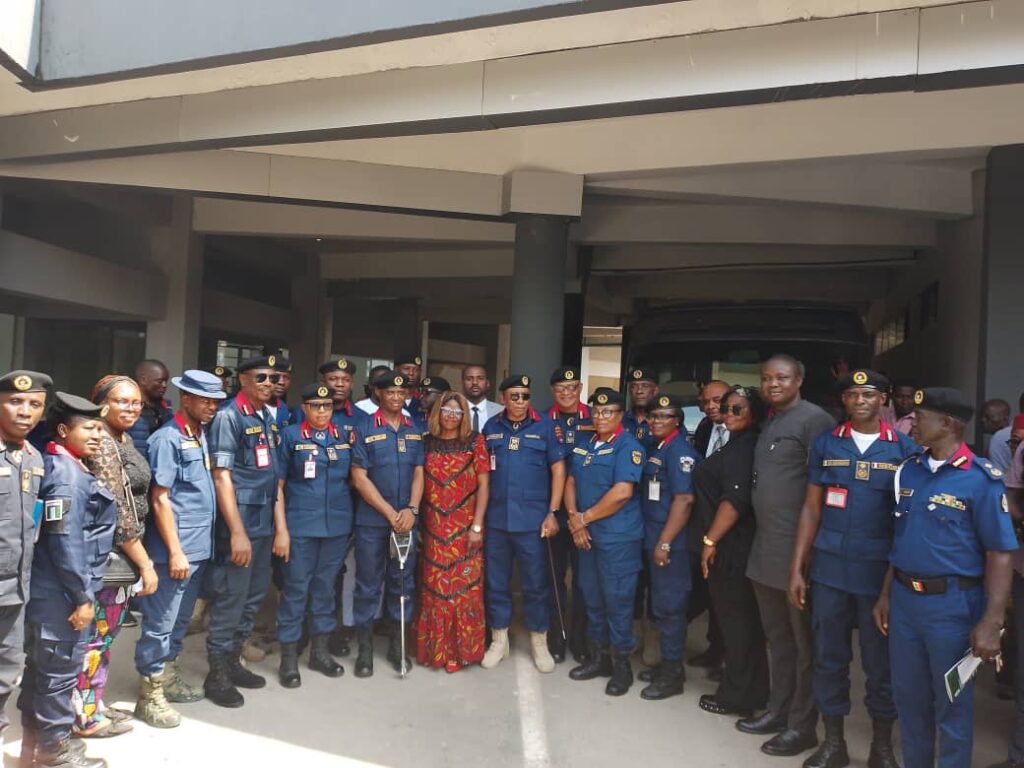An advocacy centre, the Civil Society Legislative Advocacy Centre (CISLAC)/Transparency International In Nigeria (TI-Nigeria) has urged the National Assembly to include the Nigerian Security and Civil Defence Corps (NSCDC) in the Nigerian Constitution to solidify its role in national security and clarify its functions.
The Centre said such inclusion will also , prevent potential overlapping conflicts with other security agencies and improve its effectiveness.
Executive Director, CISLAC/TI-Nigeria, Auwal Ibrahim Musa (Rafsanjani) made the presentation on Saturday at the South-East regional Consultation/ Public hearing on Constitutional review held at the International Conference centre, Enugu.

Pix: CISLAC during the presentation
Rafsanjani ,who was represented by the Executive Director, Parent-Child Intervention Centre (PCIC)
The South-East regional partner/representative of CISLAC in Nigeria , Ambassador Peggy Chukwuemeka, said CISLAC had over the years been having continuous engagements with the Nigerian Security and Civil Defence Corps (NSCDC) on different Interventions including the promotion of transparency and accountability in its operational, financial, procurement and personnel activities.
Other areas of collaboration were strengthening Nigeria’s Anti-Money Laundering, and the Countering of Terrorism Financing/Violent Extremism frameworks at national and across the six geopolitical zones in Nigeria. These include targeted collaboration and robust working relationship with NSCDC’s Anti-Corruption and Technical Unit (ACTU).
The Centre commended the NSCDC for it’s contribution in maintaining order in the society.
“We must commend the unique contributions of the NSCDC to National Security, especially in protecting critical national infrastructure, disaster management. community policing, crime prevention, counter-terrorism/violent extremism.
“We also acknowledge efforts of the agency in institutional strengthening, ethical code of conduct, anti-corruption, while maintaining open-door policy for Civil Society engagements as well as transparency and accountability in the, discharge. of its mandates.

“We at the same time stress the imperative of targeted Constitutional provisions to harmonise various contradictory legal provisions, address the lingering public. rights to information (within the context of global principles, standards and best practices) and strong Civilian Oversight, to prevent abuse, mitigate corruption risks, while improving transparency and accountability in the Defence and Security sector in Nigeria,” the Executive Director said.
The paper read in parts:
‘CISLAC/TI-Nigeria is here today, to articulate its position in support of enshrinement of the Nigerian Security and Civil Defence Corps (NSCDC) into the Constitution of the Federal Republic of Nigeria, for enhanced efficiency. effectiveness and transparency and in the delivery of its mandates.
“We must state that institutional strengthening across the Defence and Security sector through globally-aligned and strong legal provisions backed by effective implementation is a key factor for consideration and assessment by the Government Defence Integrity Index (GDI), a tool used to assess the effectiveness of controls in place to manage corruption risks within the Defence and Security institutions.
“Within the context of the GDI, CISLAC/TI-Nigeria understands that any well-meaning effort to achieving a strong and effective Defence/Security institution MUST be backed by appropriate legal provisions within the Constitution, to mitigate corruption risks, bridge identified gaps, enhance transparency and accountability across its political, procurement, personnel, financial, and operational activities.
“We strongly maintain that constitutional recognition for the NSCDC will help to solidify its role in national security and clarify its functions, prevent potential overlapping conflicts with other security agencies and improve its effectiveness. Also, full constitutional backing for the NSCDC would clarify its. mandate, ensure better resource allocation, Improve inter-agency cooperation, enhance civilian oversight which is critical for Improved transparency and accountability across the key components (operational, financial, political, procurement and personnel/gender) of the GDI.
“OUR RATIONALE FOR CONSTITUTIONAL RECOGNITION OF THE NSCDC:
In addition to this background, we therefore submit the following as a rationale for the constitutional recognition of the NSCDC:
1. Clarifying roles, defining mandate and preventing conflicts: Dedicated constitutional provisions will clearly define NSCDC’s responsibilities, particularly concerning the protection of lives, property, and critical national assets. This would help prevent jurisdictional disputes with other security agencies, and ensure a more harmonious working relationship.
2. Reduces misinterpretations and contradictions in the existing Constitutional provision: Cconstitutional backing for NSCDC will resolve ongoing issues stemming from misinterpretations of the existing constitutional provision, specifically Section 214, which establishes.a single police force.
3. Constitutionally assign role and explicitly stating the NSCDC’s unique and independent mandates/powers in the national security architecture.
4. Enhancing transparency, accountability, effectiveness, efficiency and adequate resource allocation for the NSCDC, to enable it acquire necessary equipment, training, and personnel to effectively carry out its duties.
5. Improving and streamlining the NSCDC’s operations for maximum efficiency, develop targeted strategies, and enhance its capacity to effectively respond to security challenges.6. Improving public access to information, trust and confidence in the NSCDC, making it easier for citizens, Civil Society and the media to cooperate with and support the agency in maintaining peace and security.
Conclusion;
We therefore, reiterate our position that constitutional recognition for the NSCDC hold significant benefits to enhance its capacity to contribute efficiently and effectively to Nigeria’s national security framework, while fostering a more secure arid stable environment for all citizens.
Signed:
Auwal Ibrahim Musa (Rafsanjani)
Executive Director, CISLAC/TI-Nigeria
Author: Maureen Ikpeama